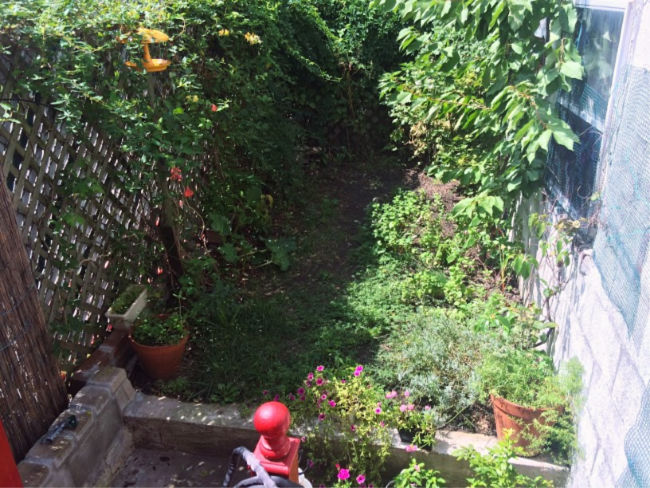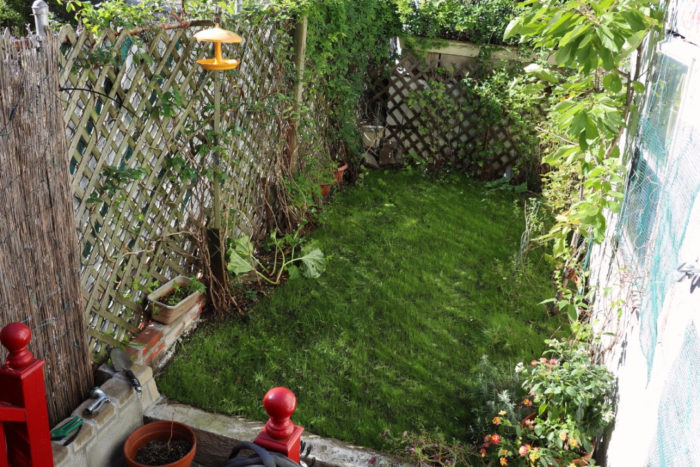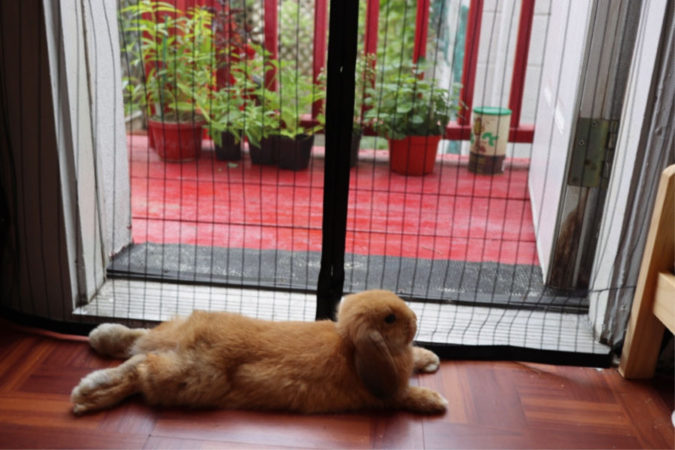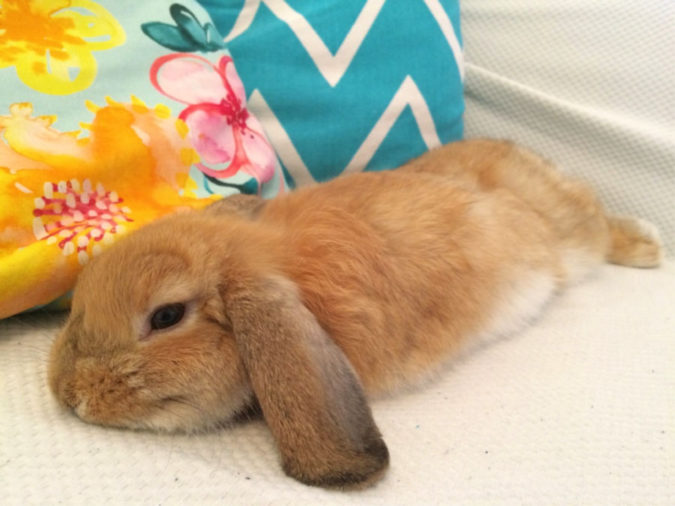As a followup to my very raw and personal post last week, I wanted to touch on the topic of grief more and some things that have been helping me weather not only this difficult time but many other losses in the past.
Grief and depression are emotions that I’ve felt acutely familiar with over the past year and change, first with the loss of my longterm home, then with the loss of my longterm pet rabbit Alexi, and now with what’s going on with my dad.
Grief is such an overwhelming and devastating feeling. I won’t say I have all the answers around this difficult emotion because I don’t. They say everyone grieves differently but I wanted to share some of the things that are currently helping me deal and have helped in the past, in the hopes that maybe they’ll be of use to others.
Here is what works for me:
1). Work with plants
Gardening has become my biggest source of peace these past few months. I chose the house I moved into recently because it came with a small deck and 7×12 backyard garden space with actual grass and soil (an anomoly in the NYC metro area!) I didn’t fully know what I was getting into when taking on this additional outdoor space… having a yard, even a small one, is a lot of work! There’s the weeding and the pruning and the watering and the fertilizing and the raking and the cutting. But lest it seem like I’m complaining, I’m not. Being out here everyday is my lifeblood. I feel physically and emotionally cleansed after spending time working with soil and leaves and grass. I feel connected and invigorated and purified.
When I first moved in this summer, the yard looked something like this:
Kind of a wild, unruly jungle!
I cut back most of the vines, removed some plants, got all the mint under control, pruned back the blackberry bushes and cherry tree to create more space, weeded and planted new grass seed, set up a new bird feeder.
This is what it looks like now with the new grass coming in. Much tidier 🙂
Though now that it’s getting colder, I’ll have to start gardening more indoors.
Which brings me to this – if you don’t have access to outdoor garden space, invest in houseplants and actively work with them. When I say “work with plants,” I don’t just mean put them on a shelf and basically forget about them except to water once a week. I mean take the time to care for them as if they were part of a yard – prune them, remove any dead leaves, freshen up the soil with some natural fertilizer if you like, dust off their leaves, check for any spots in need of some love, move them to a sunny spot in the house for a while, replant them in a bigger pot, talk to them (they’re alive after all!) When I actively get involved with my plants in this way instead of just leaving them to sit and look nice on a table, that’s when I really feel their healing and grounding benefits.
2). Keep busy
I’m all for acknowledging and honoring feelings (you might remember my post a few years back on the healing power of crying). But sometimes you just get tired of focusing on so much heavy stuff. Sometimes some good distractions are what you really need to move forward and move on with your life. I find housework and cleaning to be really effective distractions for me, which is good because there seems to be a neverending amount of that to do! I still haven’t finished setting up house yet and getting things looking the way I want – focusing on this stuff feels good, like I’m doing something productive which is ultimately creating better energy in my living space. Kind of a win-win.
3). Be gentle and forgiving with yourself
When my rabbit Alexi died last year, I literally spent a whole month in bed watching Netflix. And I’m not someone who normally even watches TV! I felt so ashamed of this behavior and my inability to cope by using “better” methods. But I’m a meditator! I’m an energy worker! WHY can’t I bring myself to use these tools now?! I felt like such a failure for hiding out in bed watching endless amounts of TV and sleeping all day.
Somewhere along the way though, I realized that everyone processes grief differently. And instead of shaming myself for doing what I thought was “different” and “not enough,” it would be far better and emotionally healthier for me to accept where I was at and tend to myself the way I was wanting. I learned a LOT from this experience and it’s one of the reasons why I will never say that watching TV is a waste of time. For me, this so-called “mindless activity” was literally what allowed me to heal and move forward. It turned out to be a vital part of the whole grieving process.
It’s so important for us to be able to drop the “shoulds” when we’re trying to heal. We are all so different and at different stages of life, it only makes sense that what works for one person may not be doable for another. You are where you are. Respond with love and work with where you’re at.
4). Journal
The thing I like about journaling (besides the obvious of getting your feelings out) is that often times when I write, I uncover thoughts or emotions I wasn’t even fully aware of. I’ll start writing about something random and all of a sudden I’m going, “Wow, I feel angry about this!” or “Wow, I had no idea that was even an issue for me!” Stuff comes to the surface when we write it out. My head will literally feel more clear and able to handle things better afterwards.
When I journal, I inevitably end up coaching myself. I’ve noticed I do this without even meaning to and I think it’s simply because I’m always trying to feel better. I like leaving my thoughts on at least a hopeful note. Even if it’s something totally vague like, “I hate feeling this way but I know it will get better, somehow.” Because of this, journaling will often leave me in a more hopeful or positive state. If you’re not used to journaling on a regular basis, my suggestion would be to sit down and just start writing. Write about the first thoughts that come to your mind, even if they don’t seem relevant or useful at all. After a while of doing this, the stuff that’s really bothering me in the back of my mind is usually drawn out.
5). Spend time with (maybe even adopt!) an animal
A couple months ago I adopted this baby girl, something I’ve been wanting to do for the past year.
She’s about 4 months old, I named her Meadow and she is the light of my life. We eat meals together, she lays by my side while I work and follows me around the house. One day when I was feeling especially sad, I sat down on the floor and just started sobbing. Meadow hopped over and (I swear she understood how upset I was) got really close by my face and just stayed there. Sat with me the entire time. It was as if she was saying, “I’m here, I’ll heal you as best I can by just being here.”
Having a little animal around and bounding through the house with joy makes it easier to cope during the hard times. It gets my mind off things and forces me to be present. As much as she benefits from all the head rubs and body massages she receives, I know I get just as much positive energy by having her around. Animal companions are incredibly healing and strengthen both our emotional and physical well-being.
That’s not to say that having a pet is easy. It’s daily work and responsibility and a commitment to care for this being for the rest of its life. It’s not for everyone but there are other ways of spending time with animals without so much responsibility like going to cat cafes, fostering an animal in need for a period of time, or volunteering at a shelter for an hour or two each week. Helping out at a shelter is what I used to do many years ago during a time in my life when I didn’t have enough stability or money for a pet but desperately missed having animals in my life.
6). Use your grief to learn and grow and put more good out into the world
When Alexi died last year, it felt like I had lost a child. But his death also fueled something in me. I wished I had given him better care and had invested more in his health over the years. I realized areas where I could have done better and I wanted to do better. I vowed that the next rabbit I got, I would put my all into ensuring that he/she had the most nutritious and cleanest diet possible – and I would do my research on rabbit health and question things instead of just going by the mainstream recommended rabbit advice. Don’t get me wrong, Alexi had a nice life. But the quality of Meadow’s life is much higher. There are things that I’ve implemented for her that I literally didn’t know about before, things that strongly impact her health and longevity. And it makes me feel good knowing that I’m setting up this little girl to thrive.
Another way you can use your grief and depression is by speaking about your pain and sharing your story with others. Maybe you can help others who are going through something similar feel less alone. Maybe you can shed some light on a difficult situation or offer up some advice. Maybe you can create something. There are countless ways that you can channel grief into healing and hope for another being. This entire blog which is focused around helping people wouldn’t even exist had I not gone through so much personal trauma with my health in 2013. Using your experience of loss, grief, and depression to fuel something bigger is an amazing way to transcend the pain of what happened and create more good in a world which desperately needs it.
7). Don’t ignore the living
Sometimes in our grief, we can unintentionally shut others out, even those who are closest to us. We may feel they don’t understand or aren’t able to help. We may be too overwhelmed with emotion or simply not want to be that downer who ruins the mood and makes everyone else in the room depressed. I think feeling this way is normal and expected; it’s good to give yourself the alone time you need. But the losses and grief of the past 1.5 years have made me realize the impermanence of all that’s in our life. Though we may not want to think about this, our friends and family members will all die one day. Our loved ones are only here for a period of time and we have no idea how much time that really is. Further more, we have no idea how long we have left ourselves.
All we can do is enjoy the time we have now with loved ones to the fullest. Make our interactions count. Spend quality time with our loved ones. Spend time making memories, laughing, forgiving, loving. I’m feeling this so strongly right now and the thing is, it’s something I can put into practice right away.
When I lost the ability to walk 5 years ago, that experience woke me up to wanting to live – wanting to live fully and deeply, experience adventure and follow my heart. I no longer felt I could settle for anything less. With all this recent grief in my personal life, it’s showing me once more that the time to live and love and appreciate is NOW. The time to make memories is now. Appreciate those who are in your life and make the time you have with them now count.
8). Connect with your spirituality
Last week I went to see Snatam Kaur perform in NYC (highly recommend seeing her live by the way!) The show reminded me so much of a kundalini class – devotional, love-filled, open-hearted, silly, joyful, connected – and reminded me of how powerful kundalini truly is. Moreover, it reminded me of how much I need this spiritual connection in my life, these days more than ever. I haven’t been the best at keeping up with my spiritual practice lately which consists of kundalini yoga, meditation, and energy work, but right now I’m recommitting to at least a few minutes of this everyday. Connecting to something bigger than myself, praying, doing something devotional and talking to my guides and angels brings me much-needed hope and peace.
++
Did I miss anything on this list ? Is there something that especially helps you get through tough times of grief and loss? I invite you to comment below and let me know what works for you. I hope this list can help.










